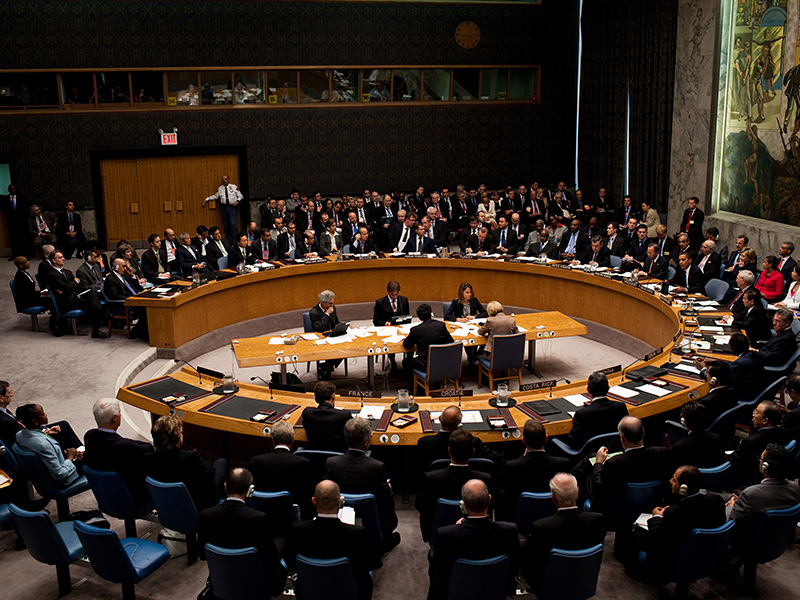Amid the controversy surrounding last month’s UN Security Council resolution slamming Israel for settlement activity and calling all territory it captured in the 1967 war illegal, Canada has kept a low profile and reiterated its support for a two-state solution.
Resolution 2334 – which passed 14-0 after the United States shocked Israel by abstaining and refusing to use its veto power – said Israeli settlements “in the Palestinian territory occupied since 1967, including east Jerusalem, [have] no legal validity and constitute a flagrant violation under international law and a major obstacle to the achievement of the two-state solution and a just, lasting and comprehensive peace.”
READ: FOUR VIEWS ON OBAMA, KERRY AND THE UNSC RESOLUTION
The Dec. 23 measure also repeated the “demand” that Israel “immediately and completely cease all settlement activities in the occupied Palestinian territory, including east Jerusalem.”
A spokesperson for Foreign Affairs Minister Stéphane Dion said Canada continues to support a two-state solution for Israel and a Palestinian state.
“As a determined peace builder, Canada supports efforts to uphold the two-state solution and to build the conditions for the parties to return to direct negotiations to find a comprehensive, just and lasting peace,” Kristine Racicot, told The CJN via email.
Paul Heinbecker, a former Canadian ambassador to the United Nations, told The CJN the resolution and Ottawa’s response differ little from official Canadian policy, which has gone unchanged for decades.
On its website, Global Affairs Canada says this country “does not recognize permanent Israeli control over territories occupied in 1967 (the Golan Heights, the West Bank, east Jerusalem and the Gaza Strip).”
It adds that Israeli settlements in the West Bank constitute a serious obstacle to peace.
Heinbecker, who served as UN ambassador from 2000 to early 2004, said the resolution is “consistent” with Canadian policy, though “not identical and certainly not contradictory. The resolution is more direct in its language and more specific than the Canadian statement is.”
He added that the UN’s stance, which has been slammed by many mainstream Jewish organizations, “is not a minority view or close call. It’s a very direct and very clear statement that the international community does not accept those parts of the Israeli narrative that have to do with its rights to the occupied territories. And that the territories are occupied is not really disputed.”
He expressed the same sentiments in a recent column for the Globe and Mail, in which he wrote that if the resolution of the 15-member UN Security Council were put to a vote in the 193-member General Assembly, “the outcome would scarcely be different… Resolution 2334 reflects what the world thinks.”
The resolution “does not question Israel’s right to exist. In fact, if anything it reinforces that right,” he added.
The measure’s passage ignited debate in Canada. “We strongly reject the wording of this United Nations resolution, which appears to suggest that the Western Wall and east Jerusalem should become part of a Palestinian state,” said Conservative foreign affairs critic Peter Kent in a Dec. 29 statement.
“Now, more than ever, Israel needs its friends and allies. Under the leadership of [former] prime minister Stephen Harper, Israel had no greater friend than Canada. Unfortunately, that is no longer the case. And the reasons for this are purely political.”
Kent said the “deafening silence on this resolution” from Ottawa, and “especially” from Dion “has once again shown that Liberals put their political goals ahead of standing up for Canada’s allies and our national interest.”
The reaction from the Centre for Israel and Jewish Affairs was more muted. “Israelis want peace,” CIJA CEO Shimon Koffler Fogel said in a Dec. 28 statement. “Polls have consistently shown most Israelis support a two-state solution, and Israel’s leaders have repeatedly called for two states for two peoples. Sadly, no Palestinian leader has affirmed the right of the Jewish People to self-determination and a state in the Middle East.”
Since 2000, Fogel noted, Israel has agreed to three U.S.-brokered peace proposals and implemented a 10-month settlement freeze. “The Palestinian leadership rejected all offers without counter-offer, and has refused Israel’s invitation to resume peace talks without precondition,” he said.
Canadians for Balfour 100, a new group that aims to educate the public about Jewish ties to Israel in the centenary year of a British statement supporting a Jewish homeland in Palestine, called the UN resolution “mischievous” and “blatantly anti-Semitic,” but said it has secured a legal opinion from a Canadian lawyer that the resolution is not legally binding.
Writing on the website of JSpace Canada, a progressive voice on Israel, Rabbi Dow Marmur, who is on the group’s advisory committee, said he is among “those who believe that the Jewish settlements on the West Bank constitute a great, perhaps the greatest, danger to Israel.” He later added, “For many of us, the settlements are indeed a problem because of what they do to Israelis, not least the soldiers serving in the territories. It turns them into reluctant, yet at times harsh, occupiers.”
Heinbecker said he thinks the governing Liberals will keep a “careful eye” on domestic fallout arising from this and other developments on the Middle East. “It’s a delicate one, and there are political ramifications. No party runs political risks lightly.”
Those opposed to the resolution and the American abstention that allowed it to pass have organized a demonstration near the U.S. Consulate in Toronto. Called “There is no Occupation: Only the Jewish People have Biblical, Historical, Legal, National Rights in Israel,” the protest is scheduled for Thursday, Jan. 12 at noon.
